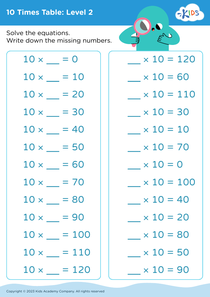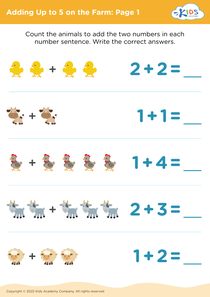Easy Data Quizzes for Ages 4-5
3 results
3 filtered results
Clear all filters3 filtered results
-
From - To
Introducing our engaging Easy Data for Ages 4-5 interactive assessment quizzes, perfectly crafted to cater to young, curious minds! These quizzes are designed to gently introduce children aged 4 to 5 to the fascinating world of data through fun, interactive questions. Each quiz checks the child's understanding of basic data concepts and provides immediate, supportive feedback to encourage learning and growth. With vibrant graphics and child-friendly language, these quizzes make learning about data an enjoyable and rewarding experience. Get ready to spark your child's interest in data with our Easy Data for Ages 4-5 quizzes - where learning meets fun!
In today's rapidly evolving digital age, the integration of technology into educational practices is no longer a novelty but a necessity. Recognizing this, our platform offers Easy Data for Ages 4-5, a series of interactive quizzes designed to make learning not only accessible but incredibly engaging for young minds. These quizzes serve as a cornerstone for children in their foundational years, promoting the development of critical thinking and problem-solving skills through the lens of data comprehension.
Understanding data and its implications is a vital skill in the 21st century. Even at the tender ages of 4 and 5, children are capable of grasping basic concepts of data when presented in a friendly and engaging manner. This is where our Easy Data for Ages 4-5 quizzes come into play. They are carefully crafted to introduce young learners to the world of data in a manner that is both fun and educational.
The quizzes cover a range of topics suitable for young children, including basic number recognition, understanding patterns, sorting and categorizing objects, and interpreting simple charts. These topics are presented through a variety of interactive elements such as drag-and-drop activities, matching games, and visual puzzles. By engaging with these elements, children are not merely memorizing facts but actively applying what they learn in an interactive setting. This hands-on approach ensures that the learning process is memorable and enjoyable.
One of the key benefits of the Easy Data for Ages 4-5 quizzes is their adaptability to each child's learning pace. The quizzes are designed to provide instant feedback, allowing children to understand their mistakes and learn from them immediately. This immediate reinforcement helps to build their confidence and encourages them to tackle more challenging concepts.
Furthermore, our quizzes are designed to be inclusive and accessible. With colorful graphics, friendly characters, and clear, simple instructions, they are created to capture the attention of young learners and hold it, making the learning process effortless and natural. This inclusiveness extends to accommodating various learning styles, ensuring that every child, regardless of their preferred method of learning, can benefit from our quizzes.
The role of parents and educators in this learning process cannot be overstated. Easy Data for Ages 4-5 provides a platform for meaningful interaction between adults and children. Parents and teachers can guide the children through the quizzes, facilitating discussions and further exploration of concepts introduced in the quizzes. This collaborative approach not only enhances the learning experience but also fosters a positive attitude towards learning and data from an early age.
In conclusion, our Easy Data for Ages 4-5 interactive quizzes are more than just educational tools; they are stepping stones towards building a solid foundation for lifelong learning. By making data comprehension accessible and enjoyable, we are preparing children for a future where they can navigate the world of information with confidence and curiosity. In doing so, we are not only enhancing their current educational journey but are also equipping them with the skills necessary to thrive in an increasingly data-driven world.











